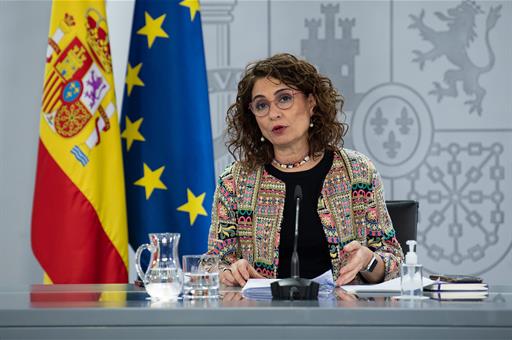Council of Ministers
Government establishes methodology to calculate electricity system charges to foster energy savings and efficiency
Council of Ministers - 2021.3.9
Moncloa Palace, Madrid
The Council of Ministers established the methodology to calculate electricity system charges. Together with tolls - set by the National Markets and Competition Commission (Spanish acronym: CNMC), the charges comprise the regulated part of the electricity bill of all users, which is in addition to the cost of the energy consumed. The charges finance the special regime of renewable energies, cover the debt from previous years and offset the overrun of generation in non-mainland territories.
The Minister for the Treasury and Government Spokesperson, María Jesús Montero, explained that the Royal Decree approved on Tuesday has the same tariff structure by voltage level as that established by the CNMC, contributing simplicity and coherence to the system. The new tolls and charges, she specified, will come into force on 1 June so that all electricity companies have to prepare for their implementation.
The combination of the tolls and charges will mean that electricity bills have a higher variable component: the total cost will depend to a larger extent on the energy consumed, which will mean that saving and efficiency measures will have a greater impact on the consumer's bill.
María Jesús Montero specified that consumers with a voltage of less than 15 kilowatts (kW) of power contracted - which applies to most domestic users and SMEs - 75% of the charges will be calculated based on energy consumption and the remaining 25% on the fixed terminal, according to the power contracted. The new legislation only fixes the methodology of the charges; their amount will be established by ministerial order, the draft of which is open for public consultation until 18 March.
Fight against tax evasion
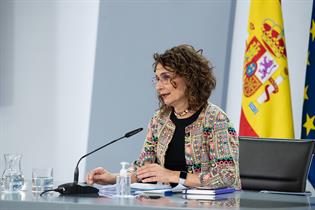 Pool Moncloa/Borja Puig de la BellacasaThe Council of Ministers modified Corporate Income Tax and Non-resident Income Tax by transposing a European Union directive to prevent tax evasion.
Pool Moncloa/Borja Puig de la BellacasaThe Council of Ministers modified Corporate Income Tax and Non-resident Income Tax by transposing a European Union directive to prevent tax evasion.
The new legislation relates to "hybrid asymmetries", which are those that may take place between a taxpayer located in Spain and a related party that is in another country when the institutions or operations performed have a different tax status in Spain and the other country. The aim is to avoid the spending being deducted in Spain if the corresponding income is not taxed in the other country, the double deduction of the same expense and other cases that allow these structures to be used as a mechanism for the erosion of the taxable base and shift profits.
María Jesús Montero stressed that the measure "does not seek to increase tax revenue but rather to prevent conduct that may lead to a reduction through tax evasion". She also said that it will allow progress to be made on a "fairer, better redistributed and more progressive system so that everyone pays according to their capacity and receives according to their needs".
Speed up accreditation of professional skills
The government agreed to introduce a permanent procedure to evaluate and accredit the professional skills that some have acquired through experience at work and non-formal training formulas.
The Government Spokesperson recalled that almost half of the Spanish active population have no formal recognition of their professional skills, despite performing daily employment activities. Over the last 10 years, she added, only the skills of some 300,000 workers have been recognised.
Through the measures promoted on Tuesday, the Ministry of Education and Vocational Training plans to accredit the skills of more than 3 million people by the year 2024. Anyone may apply for accreditation provided that they can justify at least three years of work in the skill that they wish to accredit or a minimum of 2,000 hours worked in the 15 years prior to presenting the application.
María Jesús Montero underlined that the accreditation system will be cumulative so that the beneficiary may obtain a vocational training qualification or a professional certificate in relation to the recognised areas of their skills.
'Co-responsibility Plan' to foster family balance
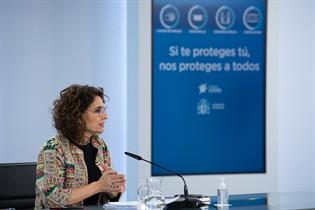 Pool Moncloa/Borja Puig de la BellacasaThe Council of Ministers approved the Co-responsibility Plan, with an allocation of 190 million euros to build a public network of services and care aimed at girls under the age of 14 and thus support the family balance.
Pool Moncloa/Borja Puig de la BellacasaThe Council of Ministers approved the Co-responsibility Plan, with an allocation of 190 million euros to build a public network of services and care aimed at girls under the age of 14 and thus support the family balance.
Minister Montero claimed that the plan is the result of "fruitful dialogue" between the Ministry of Equality and the autonomous regions and cities. This is particularly important for 'empty Spain', in order for those regions with the most disperse populations and rural areas to have sufficient resources to implement it.
The plan is based on three pillars: the creation of a suitably enabled home care or public labour exchange, fostering employment through labour exchanges with suitable professional profiles and making care work more dignified by certifying non-professional experience, which will facilitate the move to professional care.
The Government Spokesperson announced that income criteria will be established for access to the service and single-parent families, victims of gender-based or male violence and women over the age of 45 will receive preferential treatment.
Energy efficiency at agricultural holdings
The government will allocate 30 million euros to undertake energy efficiency actions at agricultural holdings with the aim of improving the competitiveness of the sector, enhance the use of renewable energies and reduce CO2 emissions, thus contributing to compliance with the National Integrated Energy and Climate Plan 2021-2030.
The Government Spokesperson stated that the support will cover up to 30% of the cost necessary to implement the projects that each company has underway and eligible actions will have to reduce final energy consumption by 10%.
6 October - 'Spanish Cinema Day'
The Council of Ministers has declared 6 October as 'Spanish Cinema Day' with the aim of acknowledging the role of film directors and their influence on cultural and social life, as well as the value of our cinema industry as cultural heritage.
María Jesús Montero highlighted that given the current economic situation as a result of the pandemic, it is essential to recognise and promote the cinema industry and its weighting in Spain.
Other agreements
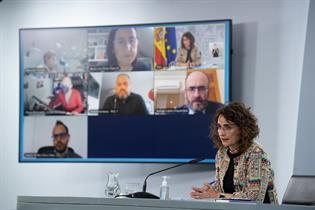 Pool Moncloa/Borja Puig de la BellacasaThe Council of Ministers authorised the Management Fund Council to Support the Solvency of Strategic Companies to carry out two new operations to provide temporary public support to the company Duro Felguera and the company Plus Ultra Líneas Aéreas S.A., affected by the pandemic.
Pool Moncloa/Borja Puig de la BellacasaThe Council of Ministers authorised the Management Fund Council to Support the Solvency of Strategic Companies to carry out two new operations to provide temporary public support to the company Duro Felguera and the company Plus Ultra Líneas Aéreas S.A., affected by the pandemic.
In addition, the government has extended until 30 March the application of entry restrictions to Spain for direct flights and vessels from the United Kingdom, and for flights from Brazil and South Africa. The aim of the measure is to contain the spread of COVID-19 and bolster health systems.
The government also modified the functioning of the State Council for the Social Responsibility of Companies so that this advisory body can be more operational and have a more balanced composition.
The Cabinet also approved a new free Regulation on Legal Aid that repeals and replaces the current Regulation that dates back to 2003. The new legislation promotes equal access to justice for those people that can substantiate insufficient resources to litigate.
Current affairs
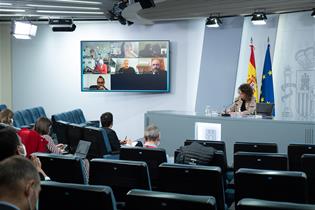 Pool Moncloa/Borja Puig de la BellacasaAt the start of her press briefing after the Council of Ministers, the Government Spokesperson stated that more than 4 million people have already received the first dose of the vaccines against COVID-19, and 1.3 million have received the second. "This week we have reached the point where more people have been vaccinated with the first dose than the total number of people infected".
Pool Moncloa/Borja Puig de la BellacasaAt the start of her press briefing after the Council of Ministers, the Government Spokesperson stated that more than 4 million people have already received the first dose of the vaccines against COVID-19, and 1.3 million have received the second. "This week we have reached the point where more people have been vaccinated with the first dose than the total number of people infected".
María Jesús Montero also expressed her gratitude for the "tremendous sense of responsibility shown by the feminist movement in the demonstrations called on Monday in different formats to traditional mass demonstrations in the street. "I believe this validates the commitment of feminism to guaranteeing the health and well-being of citizens".
María Jesús Montero also announced that an extraordinary Council of Ministers will be held on Friday to approve a raft of support of 11 billion euros to be allocated to SMEs and the self-employed announced by the President of the Government in the Lower House of Parliament on 24 February.
Non official translation





